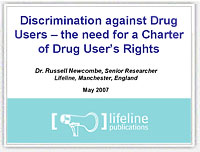A Drug Users Charter: Dr Russell Newcombe

| Why drug users need a charter: Drug users have a position in society that potentially compromises their rights in similar ways to other minority groups. They are also regularly the subject of comprehensive medical, criminal and social records. These interventions, combined with legal and public perceptions of drug use mean drug users would benefit from structural protection. |
Summary:
Medical record : drug treatment clients/drug addicts
Treatment and medication for drug problems
[Permanent record kept by GPs, hospitals & drug clinics]
Criminal record : drug offenders
Convictions/cautions & imprisonment for drug offences
[Kept on Police National Computer permanently for drug trafficking or Class A drug offences – along with child abuse, violent and sexual offences]
Social records : problem drug users
Mainly local authority records, notably Social Services and Education departments
[Record-keeping varies]
(1) In a democracy, drug use in private is a victimless crime and therefore should be permitted behaviour, not amenable to legal control by the state/government similar to gay sex.
(2) Drug-taking/addiction is partly genetic/inherited, and partly earned/environmental, i.e. not a moral choice – similar to the gender behaviour of women , and sexual orientation of gays.
(3) Some health and social services regard drug users as sub-groups of the disabled and/or the mentally ill.
(4) Some groups of drug users (notably opiate/crack addicts) have high rates of social exclusion – unemployment, poverty, homelessness, etc. – similar to black and other ethnic groups.
Second Class Citizens: Discrimination against drug users Russell Newcombe, Lifeline, Manchester , England Paper to be presented at the 7 th International Conference on Diversity in Communities, Organisations and Nations; Amsterdam , Netherlands ; July 2007. Billions of pounds are spent each year enforcing drug laws and providing services to help people with drug problems, most of whom are marginalized and socially excluded. Yet, when drug users become officially identified particularly as offenders or as treatment clients they suffer even more discrimination in every area of life, and from most sections of society. Some forms of discrimination are against all known drug users, while other forms are used against particular sub-groups. Some kinds of discrimination are absolutely unjustified, because they violate basic human rights, while others are unjustified by the relative extremeness of the response. This paper describes research into discrimination against known drug users in the UK , which identified 10 main types, involving: education, work, housing, finances, driving, travel, children, leisure, health and criminal justice. It is concluded that since there is growing evidence that drug dependence and misuse are rooted in both genes and social background, then drug users should be regarded as a minority group comparable to gays or ethnic groups, i.e. part of the natural diversity of modern societies. It is thus recommended that (1) governments need to introduce legislation to support drug users’ rights, and protect them from discrimination and social exclusion; and that (2) public education campaigns are needed to change negative attitudes toward drug users, and to counter-balance the stereotypes propagated by the mass media. |
|

